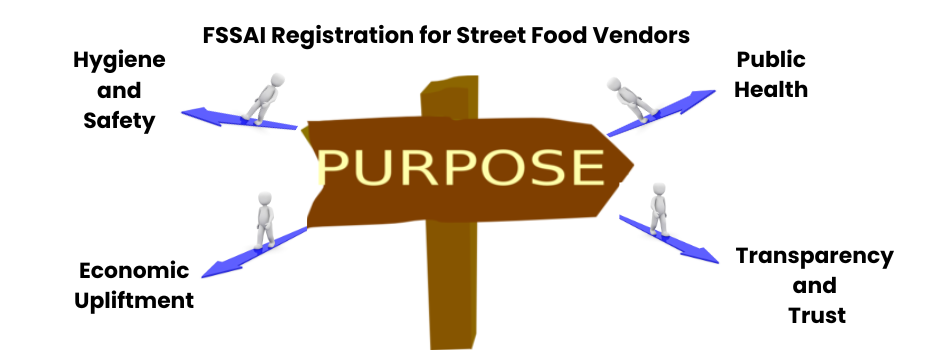The savory chaat, hot & spicy noodles, and tangy burst of golgappas are the lifeblood in the small streets of India. For this generation, these street food vendors are offering affordable & delicious food. Vendors play a major role in the economic change of India. To give a unique identity to food vendors, the government of India gives a mandatory food license/registration. The FSSAI regulation has been introduced to protect the people of India from unhealthy and chemical food. On the other hand, the food vendors who run the food business in public spaces like markets or streets are also eligible for the food license or registration. In contrast, the regulations of FSSAI play a pivotal role in structuring the future of street food vendors. In this article, we will explore how the FSSAI license for street food Vendors brings a new revolution to the food business sector, including the benefits of FSSAI registration for vendors.
What is the purpose of FSSAI registration for street food vendors?
The FSSAI registration or license connects the street food vendors with the Government of India, making it easier to monitor their food business. However, the main purpose of the FSSAI license for a street food vendor is to make sure that the food in the market meets all hygiene and safety standards. At the global brand level, the street food vendors generate a unique image by offering good quality. In addition, the testing of the food helps to protect public health. Gaining the trust of consumers and contributing to the nation’s economic growth is another use of FSSAI registration.
Meanwhile, the type of license and registration is based on the scale of the street food vendor. The scale and the size of the street food vendor business explain which type of certificate is required. To adhere to the standards of safety and hygiene, the inspection performance manages compliance. In the last, the purposes of the FSSAI registration are directly connected with the safety and quality of food, customer trust, standards of sanitation and hygiene, and many more. Overall, it helps in building the trust of consumers and also connects with the requirements of the government of India. The government of India is considering ways to bring in the new rules to improve food quality.

Key points based on the importance of FSSAI for Food Vendors
Hygiene and Safety: The FSSAI street food registration of the vendors gives potential verification for good hygiene practices. Overall, the registration follows the path of preparation and handling for cleanliness and safety. In short, the standards of safety, quality, and hygiene are directly connected with the FSSAI regulations. Through the initiatives aimed at and the regulatory role, it ensures that wholesome food is good for consumers.
Public health: The health of the public matters when food is placed in the market. The FSSAI license proves that the food goes through all food safety and quality standards, which eliminates the risk of foodborne illnesses. To ensure standardization, FSSAI delivers the inspections and also promotes awareness regarding hygienic food.
Economic Upliftment: The high grade of the food helps to create a positive image in the economic world. This causes the potential trust to build among consumers. The contribution of the Food Safety and Standards Authority of India is mandatory for the economic upliftment. Ensuring the standards of safety and quality helps in creating a positive image for street vendors. The certificate is making employment for the new food business owners.
Transparency and Trust: The additional benefit of the food registration in India for the street food vendors is to protect them from illegal issues. The process of the FSSAI registration attaches the vendors legally. According to the Schedule 4 requirements of the FSS Act, 2006, the street food vendors are certified on predefined benchmarks. Boosts the marketability by building trust among customers.
Benefits of FSSAI Regulation for Street Food Vendors in India
By offering a food certificate for food quality and safety, it will generate a bright future for street food vendors in India. The food registration is structuring the overall image of the vendors in the market. The FSSAI food guidelines for the food vendors are similar to those of other food businesses. Through focusing on sanitation quality and hygiene, FSSAI continues to work with the state government. This is a help in increasing the image of street food hubs.
The guidelines that every street food vendor in India is necessary to follow are handwashing stations, garbage disposal, and cleaning of cooking and non-cooking areas, including pest control measures. The FSSAI further introduced the Clean Street Food Hub project and standardized it, which aims to manage a safe environment for vendors in India.
To uplift food hygiene and safety, FSSAI is also bringing various new rules and regulations. During work in the market, the street food vendors are responsible for making their FSSAI license/registration number visible and giving the certificate of accountability and transparency. Meanwhile, street food vending has become too common in India. To analyse the fast setup of food in the market, the FSSAI Project Clean brought new initiatives. Project “Clean Street Food” is one of the new regulations introduced for the street vendors.
You May Also Like to Read…(Food License Consultants)
Introduction of the Clean Street Food Project by FSSAI
The main aim of FSSAI was to launch the Clean Street Food to provide the practice and capacity potential of the street food vendors under the Food Safety and Standards Act, 2006. The rule was taken up by FSSAI under a 360-degree approach to food safety and healthy nutrition. The project was launched in March 2016 by the Food Safety and Standards Authority of India. The regulatory body of the authority is responsible for enhancing and managing the food safety standards in India. Since this project has been introduced, a lot of improvement has been recognized regarding the safety and hygiene standards across India. In the response, the “Clean Street Food” project uplifts the economic and social image of street food vendors. Training vendors, upgrading infrastructure, and establishing benchmarks are a few major features that come under the “Clean Street Food” project.
The objective for the “Clean Street Food” project is to create an image for training and building a safe food structure. Such regulations are helping Indian vendors transform into a global brand. Making a rich culinary experience and building a path of strong consumers. When the rule was introduced by the FSSAI, more than 20,000 roadside vendors received the chance to get the training to enhance their knowledge of health and hygiene.
You May Also like to Read…(Start a Food Business with Food License)
Wrapping Up!
The result is that FSSAI regulations have made a visible impact on street food vending. The circumstances of the regulations turned up the Indian food landscape in a trusted part. The food license/registration application gives the link for the connection of FSSAI with street vendors. In addition, the food vendors in India further play an instrumental role in the uplift of economic empowerment.
In addition, the FSSAI certificate connects the street food vendors with the customers who are committed to food safety. It further opens the door to the future for those who are trying to make a career in the food business. The quality of food also enhances tourism.
In India, significant tourist visits are for the multiple qualities of food. On the other hand, the food certificate is the main part to run any type of food street business. Well, obtaining the food license is not a tough task in India. Connect with fssaifoodlicense.com for the FSSAI registration/license and also get the consultation regarding its need in the food sector.
FAQ | Let’s Clear Doubts about FSSAI Street Food Vendor!
What is the penalty for street food vendors for not having an FSSAI license?
Running a street food business without a valid apply food license can result in a penalty. The manufacturers, sellers, distributors, or importers who are monitoring the food business without a food license may face imprisonment.
What is the turnover limit in street food vending for a license?
The street food business owners whose turnover is below Rs 12 lakh need to obtain basic food registration, while a food license is for those food businesses whose turnover is above Rs 12 lakh.
Can street vendors sell on Amazon with FSSAI registration?
The FSSAI certificate number allows sellers to sell on Amazon. However, the seller must follow all the rules and regulations of Amazon and FSSAI.
How to get a vendor license in India?
Obtaining a street food vendor license in India is very easy. The required documents for the certificate are a PAN card, a voter ID, a driving license, an Aadhaar card, a CA certificate, and a Memorandum of Association and Article of Association.
What is the importance of FSSAI in the food industry?
FSSAI is a science-based standard for ensuring the quality and hygiene standards of food. It further monitors manufacturing, storage, distribution, sale, and import to ensure the availability of safety.

